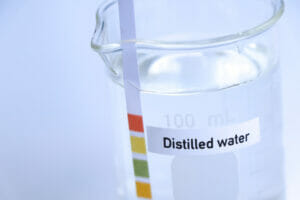We like to share product recommendations with you and hope you like them! Just to make you aware Water Filter Data may collect a small share of sales or other compensation from the links on this page.
Distilled water is safe for babies to drink and can be used in baby formula. It undergoes a purification procedure that eliminates pollutants and minerals, including fluoride, making it frequently chosen over tap water. Even trace minerals are added by certain brands for flavor. The best course of action is to speak with your doctor if you have any doubts about giving your infant distilled water.
You want to provide your newborn the greatest care possible as a new parent, and that includes giving him or her the best water to drink. Distilled water is a choice you might take into consideration. Water that has undergone the distillation process to remove pollutants, minerals, and contaminants is known as distilled water.
However, is distilled water secure and fit for infants? We’ll examine the advantages and drawbacks of using distilled water for infants in this post, as well as offer some advice on how to do so safely.

Distilled water benefits for infants
1. Purity
Distilled water has been purified to remove pollutants, minerals, and chemicals that may be present in tap water or other types of bottled water, making it one of the purest types of water on the market. As their immune and digestive systems are still developing and they may be more vulnerable to toxins and pathogens, this may be advantageous for infants.
2. Consistency
Distilled water has a stable chemical make-up and pH level, which can facilitate simpler digestion and absorption for infants. This is particularly significant for infants who are formula-fed because the formula’s composition depends on the consistency and purity of the water used to prepare it.
3. Accessibility
Distilled water is frequently offered in shops and online, and it’s typically cheap and simple to buy. For parents who might not have access to a trustworthy or safe source of tap water, or who might be traveling or residing in locations with poor water quality, this can be convenient.
Distilled water risks for infants
1. Lack of minerals
Distilled water is virtually pure H2O, thus it doesn’t include any minerals or trace elements like calcium, magnesium, or fluoride that are crucial for human health. While adults who can get these nutrients from food and supplements may not be concerned, babies who depend on water for their hydration and mineral intake may find this to be an issue.
2. Dehydration
Distilled water is devoid of minerals and electrolytes, so newborns who drink it solely or in significant amounts may experience electrolyte imbalances or dehydration. This is especially true for newborns younger than six months old, whose kidneys may not be fully matured and thus unable to efficiently control their water and electrolyte balance.
3. Acidic pH
The neutral pH of distilled water is 7.0, which is lower than the 7.35-7.45 range that is ideal for human blood and tissues. For adults, this might not be a big deal, but for infants, whose acid-base balance is still developing and who might be more sensitive to pH shifts, it might be a problem.
Tips for Giving Babies Distilled Water
1. Speak with your pediatrician
It’s crucial to discuss using distilled water for your infant with your pediatrician and receive their advice. They may provide you advice on how to use distilled water safely and assist you in determining whether it is suitable given your baby’s age, health, and nutritional requirements.
2. Use in moderation
Infants shouldn’t rely solely on distilled water for hydration; it may be suitable for sporadic usage or as a supplement to formula or breast milk. It’s crucial to give your infant breast milk or formula first, and you should only use distilled water if absolutely essential or as directed by your child’s doctor.
3. Add minerals and electrolytes
You can add some mineral drops or electrolyte powder to distilled water to boost its nutritious value. This can assist in giving your infant the vital minerals and electrolytes that distilled water lacks. But before adding any, make sure to follow the dose guidelines and talk to your pediatrician.
4. Store correctly
Distilled water needs to be stored correctly to avoid bacterial growth and pollution. Avoid storing it for an extended period of time and make sure it’s in an airtight, clean container. within opening the bottle, it is advised to use the distilled water within a few days and to discard any remaining water within 24 hours.
5. Examine alternatives
If you’re worried about the hazards or disadvantages of giving your baby distilled water, you may want to think about your other options. You might use purified bottled water or filtered tap water, for instance, both of which have undergone safety and purity testing. To enhance the quality of your tap water, you might also think about using a filter or a purifying system.
Conclusion
In instances where tap water may not be dependable or safe, distilled water can be a practical and safe alternative for infants. But before introducing distilled water to your baby’s diet, it’s crucial to use it sparingly and check with your doctor. You can give your infant the finest care and nutrition possible by adhering to these guidelines and using distilled water safely.
Other articles of interest:
Distilled water vs Purified water
Distilled water vs Spring water



